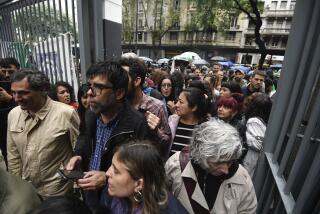Miners’ Strike Spreads to 10 Cities in Siberia
- Share via
MOSCOW — A miners’ strike spread Friday to 10 cities in a coal-rich region of Siberia, making it the largest industrial job action under President Mikhail S. Gorbachev and reflecting growing public frustration with the Communist Party’s failure to meet hopes raised by promises of economic and social reform.
Workers in construction and other professions also walked off their jobs in at least one city in solidarity with the miners, the labor newspaper Trud reported.
The intensified strikes came despite unprecedented government flexibility in negotiating with miners in the city of Mezhdurechensk, where the job action began Monday, and in agreeing to meet 36 of their 42 demands.
The strikers’ committee in Mezhdurechensk, in southwestern Siberia, agreed Thursday that the workers would return to the pits. But the official Tass news agency said Friday that the miners had defied the committee, were rallying outside the mines and had now “added political slogans to their social and economic demands.”
Explaining the Anger
“We were told for years: ‘Put out more coal and don’t worry about anything. We’ll feed you and dress you, give you housing,’ ” miner Nikolai Yatsenko was quoted as telling the government newspaper Izvestia on Friday in explaining the miners’ anger.
“We worked our heads off, put out coal, and now we hear: ‘Not only do you have to put out coal, you have to take care of yourself in everything else too,’ ” he said. “No matter who you turn to with your requests and complaints, no good comes of it, only promises.”
Gorbachev, as part of his policy of perestroika, or restructuring of Soviet society, has called for workers to do their jobs more responsibly and efficiently. In return, he has promised to improve living standards, including meeting basic requirements such as adequate food and housing.
But shortages and overcrowding remain a fact of life for most people in the Soviet Union, particularly those living in the isolated Far East, and increasingly the public has become impatient with the party for its failure to match words with deeds.
Crime Rate Increasing
That frustration is evident in a number of spheres, including a dramatically increased crime rate, spreading ethnic unrest and public anger at party officials, many of whom failed to win seats to the Congress of Peoples’ Deputies in the March elections.
Analysts have said that the success of Gorbachev’s daring reforms now rests simply on his ability to meet demands for more food and single-family housing.
In an open letter to the Soviet government, the striking miners demanded “that the population in Siberia and the Far East be supplied with food in accordance with dietitians’ norms, that privileges to officials be abolished and that a new national constitution be published for discussion immediately and adopted not later than Nov. 7, 1990,” Tass reported.
The miners’ protest is the largest reported industrial strike since Gorbachev took over the reins of the Communist Party more than four years ago. Only two cities in the Kuzbass region, Belovo and Anzhero-Sudzhensk, were still unaffected by strikes as of Friday, Tass said.
Previously in the Soviet Union, strikes were publicly viewed as a capitalist phenomenon caused by exploitation of workers, and job actions were never reported in Soviet media and sometimes were brutally crushed.
Given Pay Hikes
On Thursday, Coal Industry Minister Mikhail I. Shchadov signed an agreement giving Mezhdurechensk’s 12,000 miners $80 million in pay hikes and more economic control over their mines.
But Friday, the strikers said their complaints could not be resolved until Communist Party and government leaders personally come to the region.
In the town of Osinniki, 20 miles from Mezhdurechensk, builders and workers from some other unspecified professions also walked off their jobs in solidarity with the miners, “filling the square in front of the town hall and nearby public gardens,” Trud reported.
More to Read
Sign up for Essential California
The most important California stories and recommendations in your inbox every morning.
You may occasionally receive promotional content from the Los Angeles Times.













